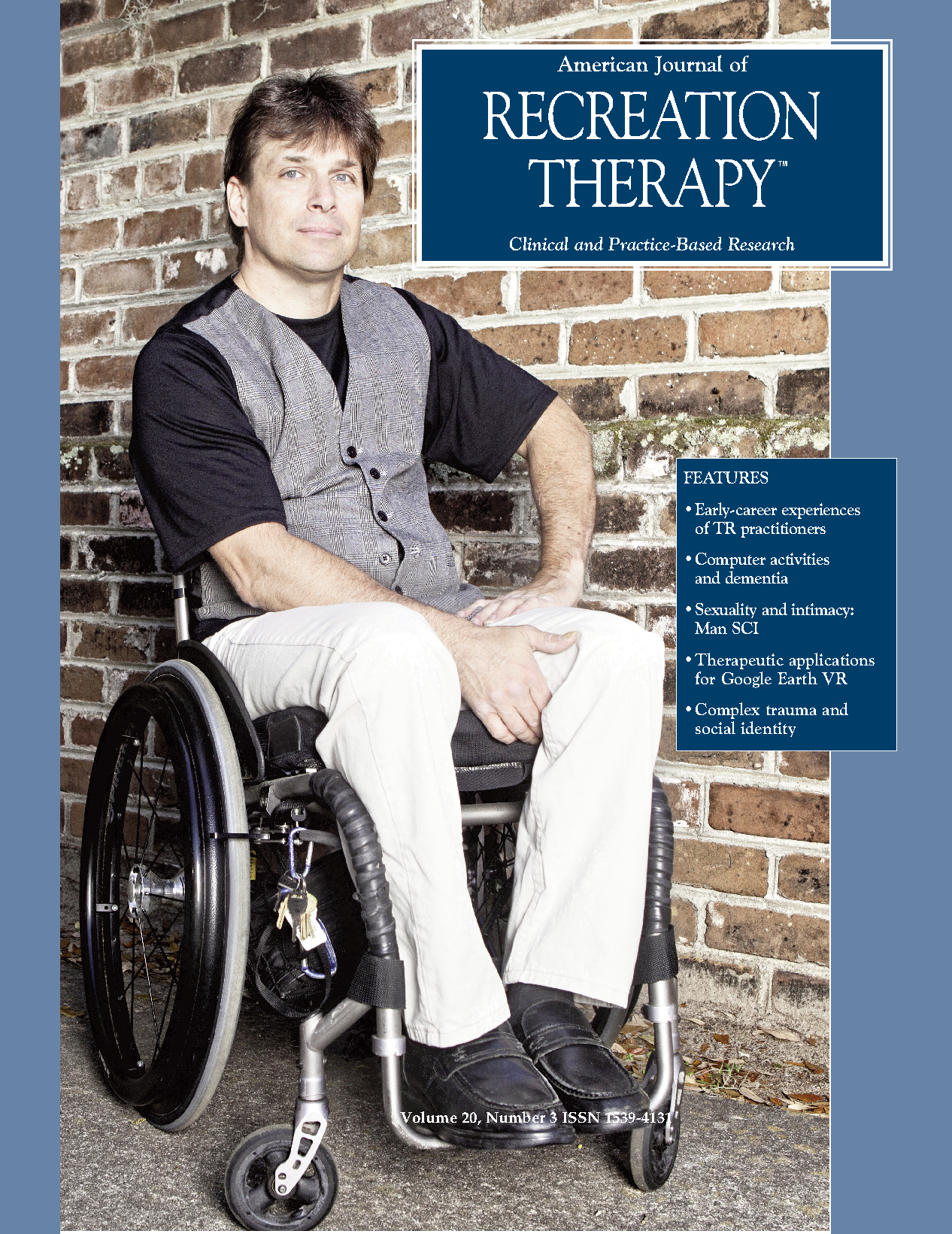Engaging in preferred computer activities and cognitive outcome
DOI:
https://doi.org/10.5055/ajrt.2021.0237Keywords:
computer activities, preference, cognitive function, dementia, eldersAbstract
Valuing an individual’s choice in activities is important in person-centered dementia care. This study examined changes in cognitive function among long-term care residents with dementia, following engagement in preferred computer activities. Over a 7-week period, a total of 585 observational activity-monitoring logs from 26 participants were collected. The most frequently selected computer activities were playing computer games and watching audio-visual media. Cognitive function significantly improved more in participants who spent more than 580 minutes on computer activities than those who spent less. A regression analysis showed that time spent in playing computer games was the only predictor to explain changes in cognitive function. The findings suggested that engaging in preferred computer activities may not only be meaningful and enjoyable but also promote cognitive function.References
Faucounau V, Wu YH, Boulay M, et al.: Cognitive intervention programmes on patients affected by mild cognitive impairment: A promising intervention tool for MCI? J Nutr Health Aging. 2010; 14(1): 31-35.
Van Rijn H, Van Hoof J, Stappers PJ: Designing leisure products for people with dementia: Developing the chitchatters’ game. Am J Alzheimers Dis Other Dement. 2010; 25(1): 74-89.
Iizuka A, Suzuki H, Ogawa S, et al.: Can cognitive leisure activity prevent cognitive decline in older adults? A systematic review of intervention studies. Geriatriatr Gerontol Int. 2019; 19(6): 469-482. DOI: 10.1111/ggi.13671.
Almeida OP, Yeap BB, Alfonso H, et al.: Older men who use computers have lower risk of dementia. PLoS One. 2012; 7(8): e44239. DOI: 10.1371/journal.pone.0044239.
Tak SH, Zhang H, Hong SH: Preferred computer activities among individuals with dementia: A pilot study. 2015; 41(3): 50-57.
Riley P, Alm N, Newell A: An interactive tool to promote musical creativity in people with dementia. Comput Hum Behav. 2009; 25(3): 599-608. DOI: 10.1016/j.chb.2008.08.014.
García-Casal JA, Loizeau A, Csipke E: Computer-based cognitive interventions for people living with dementia: A systematic literature review and meta-analysis. Aging Ment Health. 2017; 21(5): 454-467. DOI: 10.1080/13607863.2015.1132677.
Department of Health and Human Services: Report to Congress: Aging Services Technology Study. 2012. Available at https://aspe.hhs.gov/basic-report/report-congress-agingservices-technology-study. Accessed December 10, 2020.
Alzheimer’s Association: 2013 Alzheimer’s disease facts and figures. Alzheimers Dement. 2013; 9(2): 208-245. DOI: 10.1016/j.jalz.2013.02.003.
Alzheimer’s Association: 2018 Alzheimer’s disease facts and figures. Alzheimers Dement. 2018; 14(3): 367-429.
Prince M, Prina M, Guerchet M: World Alzheimer Report 2013 Journey of Caring. 2013: 1-92, London, UK. Available at https://www.alzint.org/u/WorldAlzheimerReport2013.pdf. Accessed December 10, 2020.
Tak SH, Beck C, Hong SH: Feasibility of providing computer activities for nursing home residents with dementia. Nonpharmacol Ther Dement. 2013; 3(1): 1-10.
Namazi KH, McClintic M: Computer use among elderly persons in long-term care facilities. Educ Gerontol. 2003; 29(6): 535-550. DOI: 10.1080/713844391.
LeBlanc LA, Raetz PB, Baker JC: Assessing preference in elders with dementia using multimedia and verbal pleasant events schedules. Behav Intervent. 2008; 23: 213-225. DOI: 10.1002/bin.
Centers for Medicare & Medicaid Services: Minimum Data Sets (MDS) Active Resident Information Report: Third Quarter 2010. Baltimore, MD: Centers for Medicare & Medicaid Services; 2011. Available at https://www.cms.gov/Research-Statistics-Data-and-Systems/Computer-Data-and-Systems/MDSPubQIandResRep/index. Accessed December 10, 2020.
Beck C, McSweeney J, Richards K: Challenges in tailored intervention research. Nurs Outlook. 2010; 58(2): 104-110. DOI: 10.1016/j.outlook.2009.10.004.
Klimova B, Maresova P: Computer-based training programs for older people with mild cognitive impairment and/or dementia. Front Hum Neurosci. 2017; 11: 262. DOI: 10.3389/fnhum.2017.00262.
Fazio S, Pace D, Flinner J: The fundamentals of person-centered care for individuals with dementia. Gerontologist. 2018; 58(Suppl. 1): S10-S19. DOI: 10.1093/geront/gnx122.
Brooker D: Person-Centered Dementia Care: Making Services Better. London, Jessica Kingsley Publishers, 2007.
Gitlin L, Winter L, Earland V: The tailored activity program to reduce behavioral symptoms in individuals with dementia: Feasibility, acceptability, and replication potential. Gerontologist. 2009; 49(3): 428-439. DOI: 10.1093/geront/gnp087.
Dolye PJ, Rubinstein RL: Person-centered dementia care and the cultural matrix of othering. Gerontologist. 2013; 54(6): 952-963. DOI: 10.1093/geront/gnt081.
Kim SK, Park M: Effectiveness of person-centered care on people with dementia: A systematic review and metaanalysis. Clin Intervent Aging. 2017; 12: 381-397.
Tak S, Kedia S, Tongumpun T: Activity engagement: Perspectives from nursing home residents with dementia. Educ Gerontol. 2015; 41(3): 182-192.
Folstein M, Folstein SE, McHugh PR: “Mini-Mental State” a practical method for grading the cognitive state of patients for the clinician. J Psychiatr Res. 1975; 12(3): 189-198.
Alm N, Astell A, Gowans G: Engaging multimedia leisure for people with dementia. Gerontechnology. 2009; 8(4): 236-246. DOI: 10.4017/gt.2009.08.04.006.00.
Pew Research Center: Older Adults and Technology Use. 2014: 1-27, Washington D.C.: Pew Research Center. Available at https://www.pewresearch.org/internet/2014/04/03/olderadults-and-technology-use/. Accessed December 10, 2020.
Dementia Initiative: Dementia Care: The Quality Chasm. 2013. Available at http://www.ccal.org/national-dementiainitiative/white-paper/. Accessed December 10, 2020.
Published
How to Cite
Issue
Section
License
Copyright 2000-2025, Weston Medical Publishing, LLC and American Journal of Recreation Therapy. All Rights Reserved.


